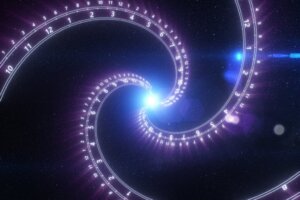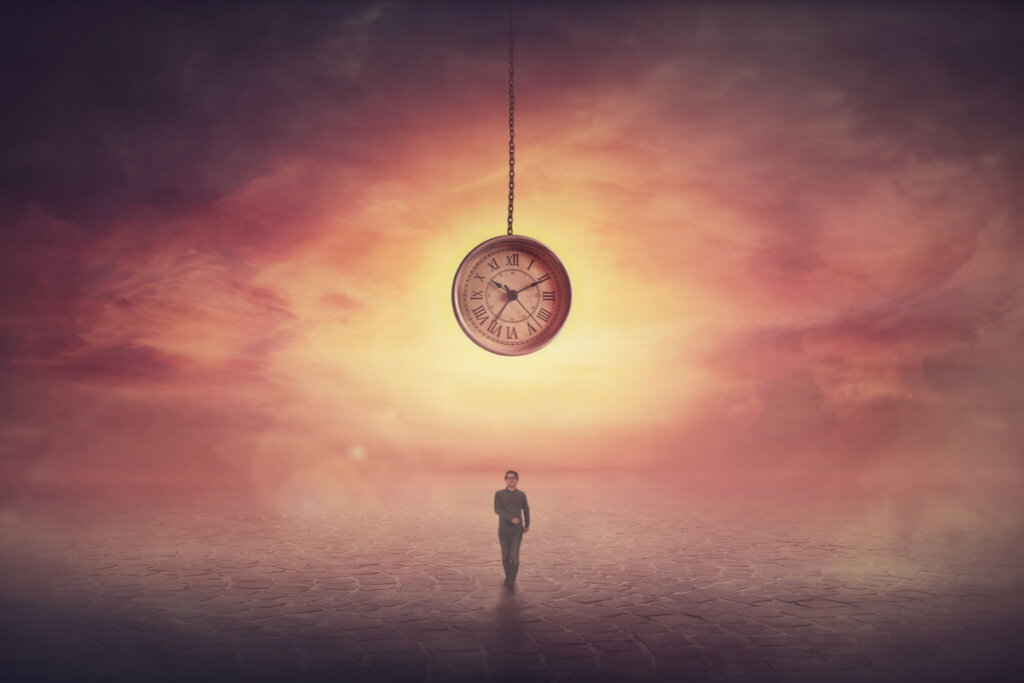Julian Barbour: Time Flows in Both Directions at the Same Time


Reviewed and approved by the psychologist Sergio De Dios González
Since it first appeared on the scene, quantum physics has never ceased to amaze. Julian Barbour is a worthy representative of this approach. In fact, for several decades he’s been studying one of the most enigmatic concepts in the universe: time. His theory is fascinating.
According to Julian Barbour, time flows both ways at once. Imagine that each direction is an arrow whose origin is zero. While the arrow on the right increases gradually to infinity, the one on the left points to negative infinity.
Put more simply, what Julian Barbour is proposing is that there’s a universe in which time runs from what we call the past to what we call the future. Meanwhile, in another universe, the opposite occurs: time moves from the future to the past. Science fiction? No, it’s a serious scientific theory.
“If nothing happened, if nothing changed, time would stop. Because time is nothing but change. It is the change we see happening around us, not the weather. In fact, time does not exist”.
-Julian Barbour-
The universe and the big bang
The most accepted theory about the beginnings of the universe suggests that it originated a little less than 14 billion years ago from an element smaller than an atom. This would form all the matter that makes up the universe.
That matter began to expand, a trend that continues today. The explosion would also have given rise to time, which, from that moment on, would have begun to be counted. The matter particles, shot in multiple directions, were grouped together and formed stars, planets, and galaxies.
According to this theory, time moves in only one direction: forward. However, Julian Barbour and other physicists have wondered: why, if the universe is expanding everywhere, does time only move in one direction? The possible answers to this question gave rise to the thesis that time runs in two directions.
Julian Barbour and time
Julian Barbour is a veteran physicist, a professor at the University of Oxford, and the author of several popular books. His prestige is unquestionable. He’s thoroughly studied the subject of time and it’s from these studies that he put forward his interesting theory. He basically proposes that time runs in two directions at once.
Barbour claims that the original big bang caused time to start going in opposite directions, since that’s the nature of such an explosion. His idea is based on two principles of physics: entropy and the second law of thermodynamics.
Entropy is a concept equivalent to chaos. Physics indicates that reality, or rather the systems that compose it, is advancing toward chaos. In turn, chaos is irreversible. An example of this would be a house that’s abandoned and falls down. The process goes on until it collapses and it’s impossible to reverse. In fact, its collapse is the most chaotic state possible.
The second law of thermodynamics claims that entropy can increase, but never decrease. In turn, time advances in the same direction as entropy increases. Thus, in the example above, once the house is abandoned and begins to deteriorate, it’s increasingly likely to collapse.

The increase in complexity
Julian Barbour says that all of the above has been established as such because it’s been observed in what we might call a ‘normal’ context. That of our planet, matter, dimensions, etc. If you look at it in terms of the universe as a whole, a new approach appears.
Suppose that the collapsed house we’re talking about is in the frame of infinite space. When collapsing, the particles that compose it would travel in different directions, join with other particles and form new structures. These would be more complex.
Barbour works with two basic ideas. The Big Bang caused matter and time to move in two opposite directions. Therefore, there would be a kind of ‘mirror universe’. What would be expected in that universe would be the past, because everything happens the other way around from our own universe. In other words, what’s on that horizon is a progression toward year zero.
On the other hand, and unlike the usual theories that physics proposes, the entire universe isn’t advancing toward definitive chaos and total disorder. Instead, said universe will be increasingly complex and structured. Could Julian Barbour be right?
All cited sources were thoroughly reviewed by our team to ensure their quality, reliability, currency, and validity. The bibliography of this article was considered reliable and of academic or scientific accuracy.
- Barbour, J. (2012). El fin del tiempo. Universo. Barcelona: Crítica.
- Herrmann, F. (2018). Comencemos con la entropía. Revista Cubana de Física.[En línea], 27(2).
This text is provided for informational purposes only and does not replace consultation with a professional. If in doubt, consult your specialist.








